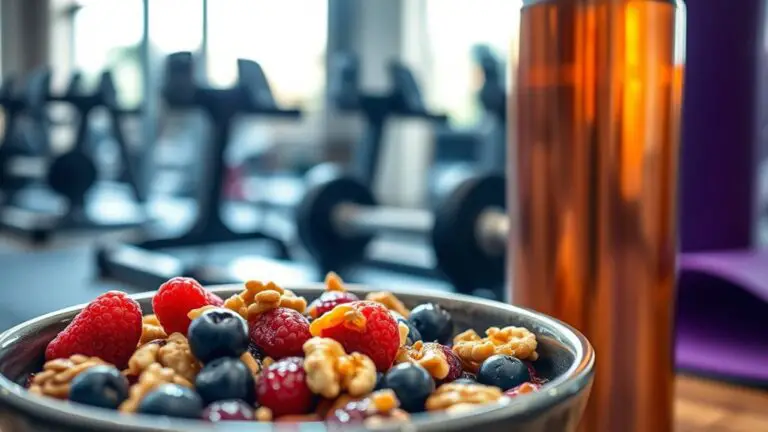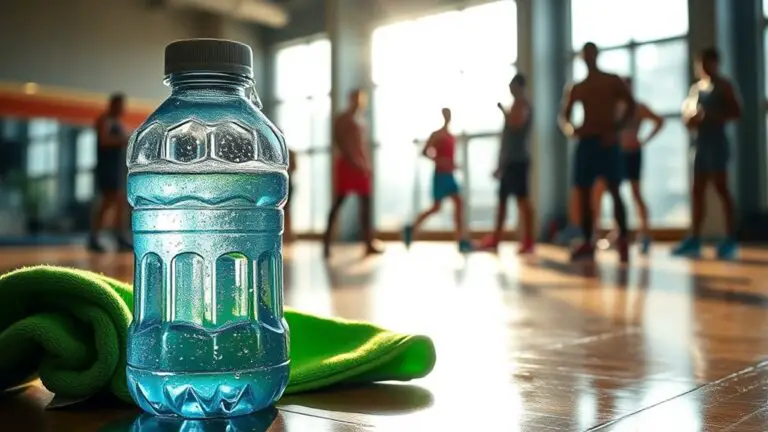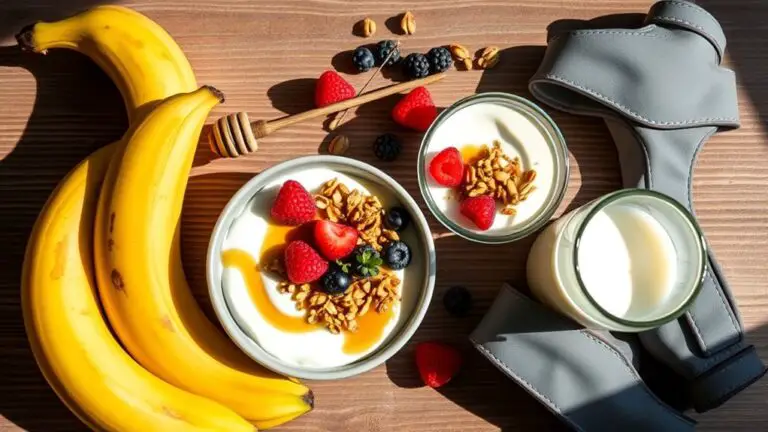How to Use Nutrition to Maximize Fat Loss in the Gym

To maximize fat loss in the gym, focus on balancing macronutrients with 40% carbs, 30% protein, and 30% fats. Prioritize meal timing by fueling up before workouts and recovering with protein and carbs afterward. Choose whole foods for sustained energy, and make fiber a staple to enhance satiety. Stay hydrated to support metabolism and muscle function. Consider supplements wisely to complement your efforts. Continue to learn more strategies for optimizing your nutrition and achieving effective fat loss.
Understanding the Role of Macronutrients in Fat Loss
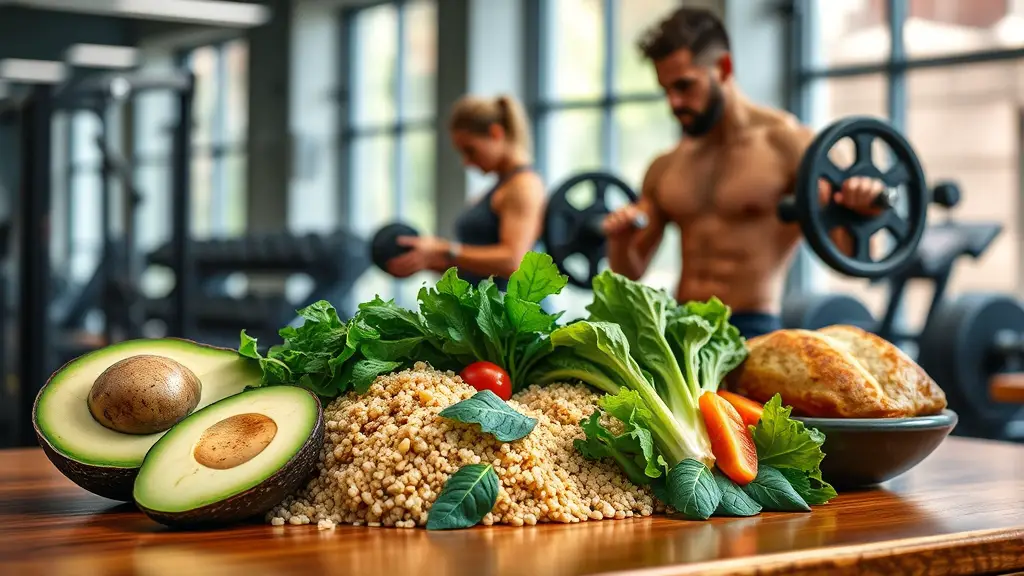
When you’re aiming for fat loss, understanding macronutrients—proteins, fats, and carbohydrates—is crucial. Protein sources, like lean meats and legumes, help maintain muscle mass while in a calorie deficit, boosting your metabolic rate. Healthy fat types, such as those found in avocados and nuts, support hormone production and overall health. Carbohydrates provide energy, but managing their intake through strategies like carb cycling can optimize fat loss.
Meal frequency also plays a role; spreading your intake throughout the day can stabilize blood sugar and curb cravings. Nutrient timing, particularly around workouts, guarantees your body has the necessary fuel for performance and recovery. Ultimately, achieving energy balance is key. You need to consume fewer calories than you burn to see results. By understanding how these macronutrients work together, you can tailor your nutrition for effective fat loss and improved gym performance.
The Importance of Meal Timing for Optimal Performance
Meal timing plays a vital role in maximizing your performance during workouts and enhancing recovery afterward. By strategically planning your pre-workout nutrition, you can fuel your body for ideal energy and endurance. Likewise, consuming the right post-workout meal helps replenish nutrients and supports muscle recovery, making it essential for anyone serious about fat loss.
Pre-Workout Nutrition Strategy
To maximize your workout performance and support fat loss, understanding the timing of your pre-workout nutrition is essential. Consuming the right pre-workout snacks can elevate your energy levels and enhance your strength. Aim to eat a balanced meal containing carbohydrates and protein about 1-3 hours before your workout. Carbs are energy-boosting foods that fuel your muscles, while protein helps with muscle recovery. If you’re short on time, opt for quick snacks like a banana with nut butter or Greek yogurt with berries 30-60 minutes beforehand. These choices provide the necessary nutrients to sustain your energy and improve your performance. Remember, the right timing and food selection can greatly impact your workout results and fat loss journey.
Post-Workout Recovery Meals
Although many people focus on pre-workout nutrition, post-workout recovery meals are just as essential for maximizing your performance and supporting fat loss. After your workout, your muscles need replenishment of glycogen and protein to recover effectively. Quick options like recovery smoothies or nutrient-dense post workout snacks can help you meet these needs. Aim for protein timing by consuming a meal with protein and carbohydrates within 30 minutes post-exercise. Meal prep can simplify this process, ensuring you have healthy choices ready to go. Don’t forget hydration focus; water or electrolyte-rich drinks can aid recovery and maintain performance. By prioritizing these strategies, you’ll enhance recovery, optimize muscle glycogen replenishment, and ultimately support your fat loss goals.
Choosing the Right Foods for Sustained Energy
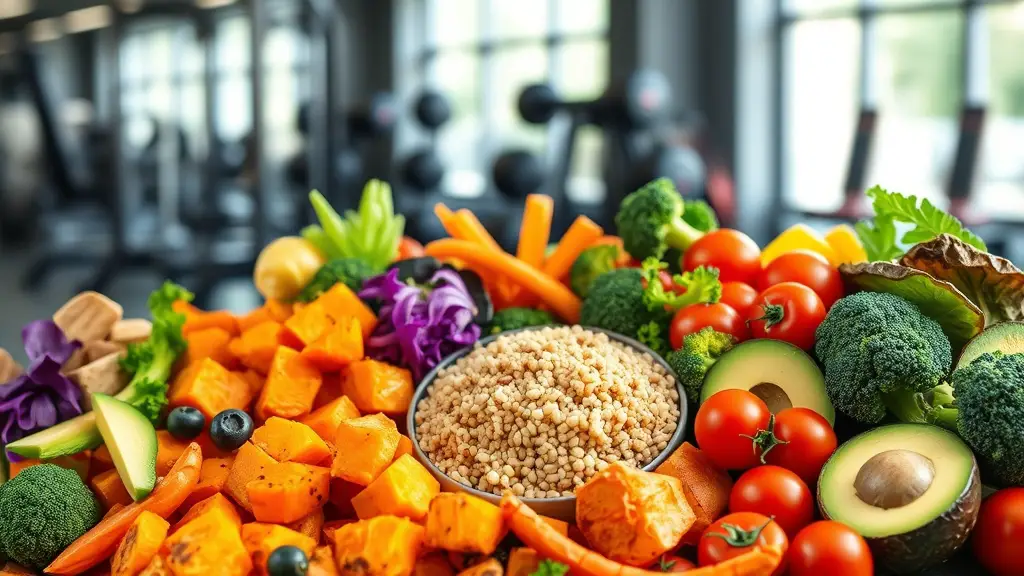
To achieve sustained energy for fat loss, you need to focus on macronutrient balance and prioritize whole foods over processed options. Timing your meals effectively can also play a vital role in maintaining your energy levels throughout the day. By making these informed choices, you can support your body’s needs while working towards your fat loss goals.
Macronutrient Balance Essentials
When you’re aiming for fat loss, understanding macronutrient balance is essential for maintaining sustained energy levels throughout the day. Focusing on macronutrient ratios—typically 40% carbohydrates, 30% protein, and 30% fats—can help optimize energy and support muscle retention. Carbohydrates provide the necessary fuel for workouts, while protein is vital for recovery and muscle growth. Don’t forget about nutrient timing; consuming the right nutrients before and after exercise can enhance performance and recovery. Aim to include complex carbs and lean proteins in your pre-workout meal, and a balanced meal post-workout to replenish energy and repair muscles. By mastering your macronutrient balance, you’ll feel more energetic and motivated to stick to your fat loss goals.
Whole Foods vs. Processed
While both whole foods and processed foods can fit into your diet, choosing whole foods is often the better option for sustained energy and overall health. Here are some benefits of whole foods:
- Nutritional Density: Whole foods offer more vitamins and minerals per calorie than processed foods.
- Ingredient Transparency: Whole foods usually have fewer ingredients, making it easier to know what you’re eating.
- Meal Prep Advantages: Preparing whole foods can enhance nutrient absorption and encourage healthier cooking methods.
- Health Risks: Processed foods often contain additives linked to various health risks, while whole foods support better well-being.
When grocery shopping, look for whole foods and prioritize natural options to maximize your nutritional intake and minimize processed foods’ drawbacks.
Timing Your Meals Effectively
Choosing whole foods is just the first step in optimizing your nutrition for fat loss; the timing of your meals also plays a significant role in how your body utilizes energy. To maximize nutrient absorption and maintain a steady metabolic rate, consider meal frequency and snack timing. Align your meals with your circadian rhythm, eating larger meals when your energy peaks, usually in the morning and early afternoon. Avoid late-night eating, as it can elevate cortisol levels and disrupt sleep, negatively impacting recovery. If you have a workout schedule, try consuming a balanced snack an hour before exercising to fuel your performance. This approach helps sustain energy throughout the day and supports your fat loss goals effectively.
Hydration: The Often Overlooked Key to Fat Loss
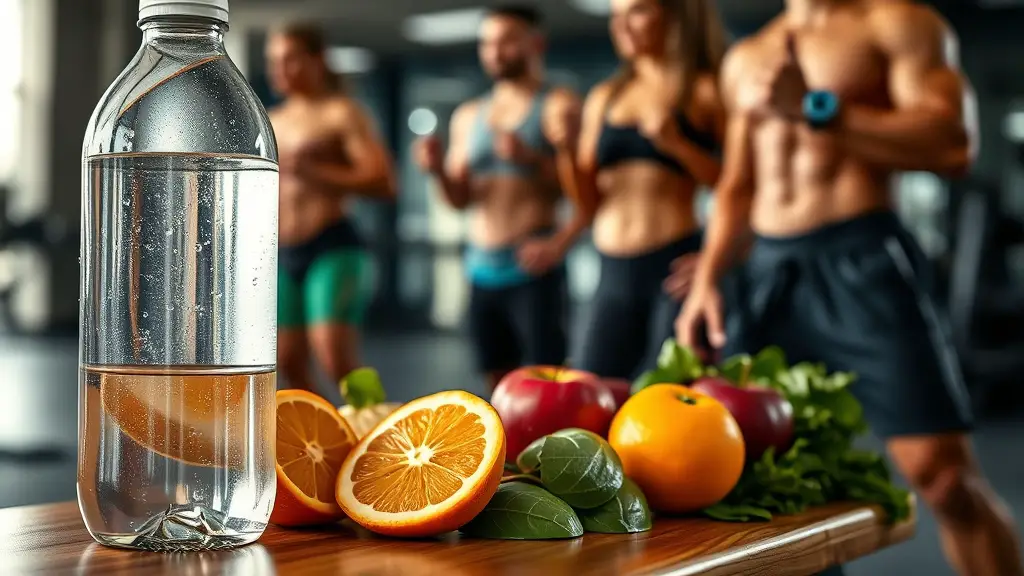
Many people underestimate the role hydration plays in fat loss, but it’s essential for achieving your weight loss goals. Staying properly hydrated not only helps maintain your energy levels but also supports your body’s metabolic processes. Here are some key hydration benefits that can enhance your fat loss journey:
Hydration is crucial for fat loss, boosting metabolism and energy while aiding recovery and appetite control.
- Improved Metabolism: Staying hydrated can boost your metabolic rate, helping you burn more calories.
- Electrolyte Balance: Proper hydration maintains electrolyte balance, important for muscle function and performance during workouts.
- Appetite Control: Drinking water can help curb hunger, reducing the temptation to overeat.
- Enhanced Recovery: Hydration aids in muscle recovery, allowing you to train harder and more frequently.
Incorporating adequate hydration into your routine is an often-overlooked strategy that can greatly impact your fat loss efforts. Remember, drinking water consistently can make a real difference!
Incorporating Supplements Wisely
Incorporating supplements wisely can enhance your fat loss journey, especially when combined with a balanced diet and exercise. Start by identifying appropriate supplement types, such as protein powders, fat burners, and omega-3s, that align with your personal goals. Always adhere to dosage guidelines to avoid adverse effects; too much of a good thing can be harmful.
Timing strategies also play an essential role; for instance, taking protein post-workout can maximize muscle recovery. Remember to take into account safety considerations, particularly if you have underlying health issues or are on medication.
Additionally, explore synergy effects—some supplements work better together, like combining caffeine with L-carnitine for increased fat oxidation. By carefully selecting and timing your supplements, you’ll be better equipped to achieve your fat loss objectives effectively and safely.
The Impact of Fiber on Satiety and Weight Management

While supplements can support your fat loss efforts, the role of dietary fiber shouldn’t be overlooked. Fiber-rich foods play an essential role in managing hunger and promoting weight loss by enhancing satiety signals. Here are some key fiber benefits to take into account:
Dietary fiber is crucial for weight loss, enhancing satiety and regulating hunger hormones effectively.
- Increases Satiety: Fiber slows digestion, helping you feel fuller longer.
- Regulates Hunger Hormones: High fiber intake can balance hormones that control appetite.
- Supports Digestive Health: Fiber aids in digestion, preventing bloating and discomfort.
- Facilitates Meal Planning: Incorporating fiber sources, like whole grains, fruits, and vegetables, can make meals more satisfying.
Strategies for Eating Out Without Sabotaging Your Goals
Eating out can be a challenge when you’re trying to lose fat, but with a few smart strategies, you can enjoy meals without compromising your goals. Start by reviewing menu choices in advance; many restaurants post their menus online, allowing you to plan. Opt for dishes that feature healthy options like grilled proteins and plenty of vegetables. Practicing portion control is key—consider sharing an entrée or asking for a to-go box to save half for later.
Be calorie aware and choose dishes that are lower in hidden fats and sugars. Don’t hesitate to make smart substitutions, like swapping fries for a side salad. In social situations, focus on food mindfulness; savor each bite and listen to your body’s hunger cues. With a little restaurant planning and these strategies, you can enjoy dining out while staying on track with your fat loss goals.
Monitoring Progress and Adjusting Your Nutrition Plan

To effectively reach your fat loss goals, it’s important to regularly monitor your progress and modify your nutrition plan as needed. Progress tracking helps you identify what’s working and what isn’t. Here’s how to do it effectively:
- Weigh Yourself Weekly: Consistent measurements provide insight into your fat loss journey.
- Track Your Food Intake: Use a nutrition app to log meals and confirm you’re meeting your macro goals.
- Take Body Measurements: Record waist, hips, and other areas to assess changes that the scale might not show.
- Adjust Caloric Intake: If you hit a plateau, consider modifying your daily calorie intake or macronutrient ratios.
Frequently Asked Questions
Can I Still Enjoy Treats While Losing Fat?
Yes, you can definitely enjoy treats while losing fat! The key is mindful indulgence. Instead of depriving yourself, consider treat alternatives that satisfy your cravings without derailing your progress. For instance, dark chocolate or frozen yogurt can be satisfying options. By planning your treats and balancing them with your overall nutrition, you can maintain a healthy relationship with food. Remember, moderation is important, so enjoy those treats without guilt!
How Do I Handle Cravings During My Diet?
Handling cravings during your diet can be challenging, but it’s manageable. First, identify your craving triggers, like stress or boredom. Once you know what sets off your cravings, you can plan for them. Instead of reaching for unhealthy snacks, keep healthy alternatives on hand, like fruits, nuts, or yogurt. These can satisfy your cravings without derailing your progress. Staying hydrated and eating balanced meals can also help reduce the frequency of cravings.
Is Intermittent Fasting Effective for Fat Loss?
So, you’re wondering if intermittent fasting is the magic wand for fat loss, huh? Well, it’s not a fairy tale, but it does have benefits! Studies show that following fasting schedules can help reduce calorie intake and improve metabolism. You’ll find it easier to manage cravings and maintain discipline. Just remember, it’s not about skipping meals; it’s about when you eat. So, if it suits your lifestyle, give it a shot!
Should I Count Calories or Focus on Food Quality?
You should consider both counting calories and focusing on food quality. To achieve a caloric deficit, tracking your intake helps guarantee you’re not overeating. However, prioritizing food variety is essential for nutrient intake and satiety. Aim for whole foods rich in fiber and protein, which can keep you full while still allowing for a caloric deficit. Balancing these approaches will support your overall health and fat loss goals effectively.
What Role Does Sleep Play in Fat Loss?
Sleep plays an essential role in fat loss by influencing sleep quality and hormonal balance. When you’re well-rested, your body regulates hormones like ghrelin and leptin, which control hunger and satiety. Poor sleep can lead to increased cravings and lower metabolic efficiency. Aim for 7-9 hours of quality sleep each night to support your fat loss goals. Prioritizing rest can help you stay focused and energized during your workouts, enhancing your overall progress.


